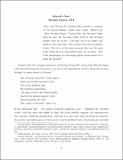Marvell's Now
Author(s)
Raman, Shankar
DownloadOriginally published in special issue of online refereed journal, but link now broken (165.1Kb)
PUBLISHER_POLICY
Publisher Policy
Article is made available in accordance with the publisher's policy and may be subject to US copyright law. Please refer to the publisher's site for terms of use.
Terms of use
Metadata
Show full item recordAbstract
Andrew Marvell’s complex panegyric celebrating Cromwell’s return from Ireland begins with the fateful moment of decision, even if it is not immediately clear to whom the decision belongs (or upon whom it is thrust):
The forward youth that would appear
Must now forsake his muses dear,
Nor in the shadows sing
His numbers languishing.
‘Tis time to leave the books in dust,
And oil the unused armour’s rust:
Removing from the wall
The corslet of the hall. (lines 1-8)
If the subsequent line – “So restless Cromwell could not cease” – identifies the “forward youth” with the man who might be king, the poem initially suggests (as commentators have noted) a different identification: with the poet who now steps out from the shadows, the private and hidden spaces of love poetry and book-filled study, abandoning his erstwhile muses to enter a public space. And this entry is likened to military dressing and engagement. To don the “corslet of the hall” is to take up an armour that not only resides in or decorates the public space but belongs to it, standing metonymically for the kind of engagement
that “must now” be undertaken by both Cromwell and poet. Reading the “So” of line nine as “thus” or “in such a manner” sets the seal on the implied alignment between the poet’s imperative in the present and the political restlessness that drove Cromwell from the “inglorious arts of peace” to “adventurous war” (lines 10-11). Alternatively, reading the
“So” as “therefore” aligns the precocious Cromwell more closely with the “forward” youth, construing the litany of his achievements that follow as exempla, instantiations in the past of the kinds of decision that now, in the historical present, stand before the man again (and by extension face the poet who would appear to record them).
Date issued
2007Department
Massachusetts Institute of Technology. Literature SectionJournal
Early Modern Culture
Publisher
Clemson University Press
Citation
Shankar, Raman. “Marvell’s Now.” Early Modern Culture 6 (2007)
Version: Author's final manuscript
ISSN
1939-0246